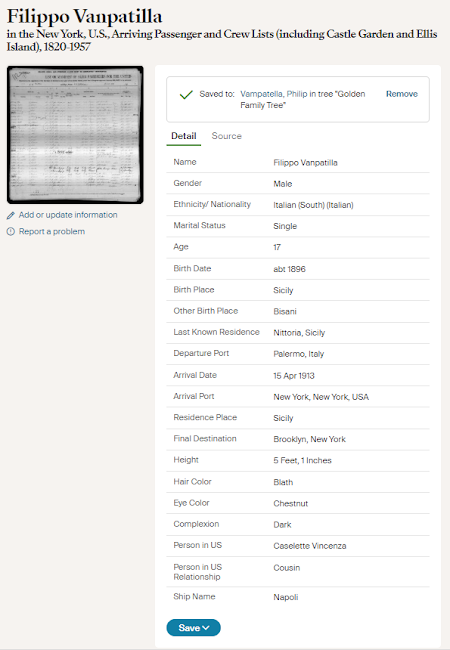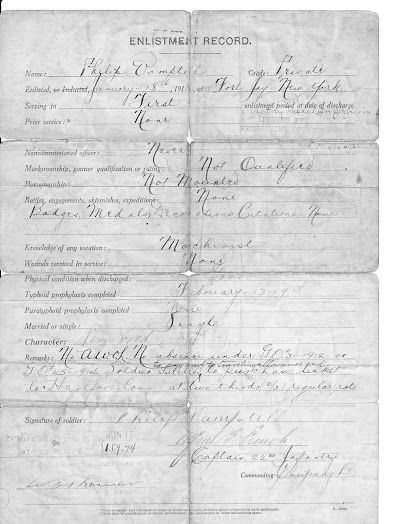Prompt: Changing Names: February 24, 2024
This prompt resonated deeply with me, as several members of my family have undergone name changes. My great uncle, Charles Beccherini, legally shed his Italian surname, becoming Charles Beech, perhaps aiming to lessen its influence on his identity. Similarly, my great uncle Anthony Rapuano adopted the name Freddie Rappuano. Rumors swirled that he held a low-level position within the mafia, possibly prompting the change. Unlike these relatives, my grandfather Andrew Titone retained his name, but his children adopted their stepfathers' surnames, presumably seeking distance from him. While each alteration likely stemmed from personal rationale, instances of reverting to the original name are uncommon. a notable exception was my other grandfather, Philip Vampatella, who eventually reclaimed his original name. Here is his story.
1896 September 14 - Filippo Vampatella was born in Biscari, Sicily. When dinner time came his mom would yell for him, "Filippo, vieni e mangia!" (Filippo, Come eat!) When he needed to be disciplined his father might say, "Filippo, non farlo!" (Filippo, don't do that!)
Filippo's Civil Birth Record
Searching for Filippo's immigration record was quite the challenge as the transcription of his name was "Filippo Vanpatilla". Making the discovery of his immigration more difficult. The copy of the record is poor and almost impossible to read and I can see how someone would transcribe his name incorrectly.
1914 July - WWI broke out.
1915 February - Philip as he was now called in America, writes in Passeggiata, "...word from Angela about some urgent business at home. So, Biagio borrowed some money, told his boy he would be back soon and boarded the first ship back to Italy."
He continues to write, "Letters from home informed the boy Biagio could not come back right away but that he would as soon as he was able to."
Although, I cannot be certain as to the urgent matter back in Italy that Angela referred to, I can speculate. When Biagio and Filippo left Sicily in March of 1913 - Angela was expecting. I don't know if Biagio knew or not, I'd like to think he didn't know. On September 10th, 1913, in the town of Vittoria, Angela gave birth to a set of twin boys - Mario and Giovanni. Angela was now taking care of her 3 daughters, Giovaninna, Angelina and Maria as well as infant twin sons. Maria, the twin's sister (our aunt Mary), indicated they died when they were 2. The cause of their deaths, whether illness or accident, remains unknown.
1915 May 23 - Italy enters World War I. In Passeggiata, Philip says he would get letters from his father, Biagio,
Often he wrote his son to return home and do his duty in the army. Philip let his father's suggestions slip by unheeded but sent home some money every time he wrote.
From home news continued on the gloomy side. Biagio, Angela and the girls felt the pinch of hunger; food was scarce due to so many men taken from the fields into the army. Few women were able to take men's places.
Cousin Rosario had stopped an Austrian bullet somewhere in the Alps. Cousin Giovanni awaited induction, Cousin Biagio was still too young but anxious to go. Sister Giovannina had a sweetheart in the army. Sister Lina helped Angela care for a set of twins born since Biagio's return home; These two brothers Philip never came to know: they died in infancy. Sister Maria was yet at school.
With this picture before his eyes, Philip could not reconcile himself with the idea he owed his native land anything. Biagio continuously wrote him to return home and help win the war. Philip never had enough money to pay passage back. He was blissfully ignorant of the fact he could have gone free of charge. He continued to demure, some impulse telling him to stay back and work and keep sending money home. Biagio wrote he would contact people in high place to compel his son to return and do his duty.
Philip did not like this because he had begun to like America. He was afraid too, that Biagio, a man of his word, would carry out the threat. Philip left New Haven, assumed a spurious name, went to New Britain, stopped writing home.
Philip was caught between his family back in Italy and his new home, America. Italians were not favorably looked upon here in the United States and a name like Vampatella was clearly an Italian name. Judgements were made just by hearing a name like that.
1917 July 11th, he applied for Naturalization using the name Philip Vamptell.
1918 January 18th, he joined the United States Army under the name Philip Vamptell. he was a private in the 22nd regiment of the U.S. Infantry.
Off-handedly the sergeant fished for information. he wanted to know why the boy had misspelled his name.'You seem to know your a-b-c's pretty well,' said the sergeant. 'I know most Italian names end in a, e, i or o. Why not yours?'
'Simple, sarge. I like to Americanize my spelling. That should be reason enough. But I don't mind telling you the real reason: I don't like to be in the Italian army.'
'That's a reason? Pretty slim, isn't it?'
'I'm not ashamed of the Italian army. I'm not ashamed of the misspelling of my name. I'm simply afraid.'
'Afraid of what? Do you think the American army is going to pamper you?'
'No, my father is still in Italy. For the last 2 years he has begged me to enlist in the Italian army. Since I have turned a deaf ear to his pleas, he has finally threatened me to have some responsible people in Italy contact some responsible people here to force me back to the old country.'
'That's a lot of bunk. They couldn't do that in the first place. Or could they?'
'I don't know. I just want to play it safe.'
1918 June, Philip along with 3 other soldiers were ordered to get on the ferry and then they were taken to City Hall in New York City. The young men were scared, and one claimed, "I didn't do nothin!" They were ushered into a room with a man in a black robe, told to raise their right hands and made them swear allegiance to the United States of America and declared them US Citizens. Philip writes, "Philip had yet to grasp the importance of being an American Citizen, but not for long. He only regretted the misspelling of his name."
Philip did not maintain the name Vamptell. He went back to using his Italian birth name of Vampatella. He must have been bothered by his name change and in 1962, after he got married and had children, he didn't want that name haunting him or his children and had the following document drawn up declaring that Filippo Vampatella, Philip Vamptell and Philip Vampatella were the same person.
My grandpa was a very special man. So glad he wrote his story so the rest of us could understand and appreciate what he endured. I'm proud he kept his name Vampatella!!





